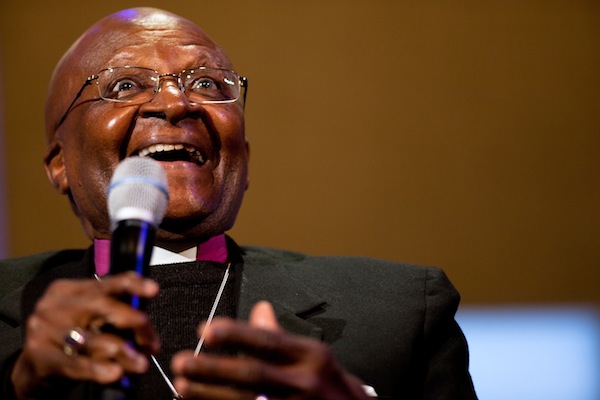Far from being upset about Archbishop Desmond Tutu repeating something he first said nine years ago, Tony Blair should be proud of his achievements in Iraq. This aspect of Blair’s legacy was raised again over the weekend when Tutu pulled out of an event where he was due to share a stage with the former Prime Minister.
It is curious that while Tutu refused to associate with Blair he has happily endorsed the ‘Global March to Jerusalem’. Its members include Ahmed Abo Halabiya who is part of the Hamas administration in Gaza. During a speech he told followers:
‘Have no mercy on the Jews, no matter where they are, in any country. Fight them, wherever you are. Wherever you meet them, kill them. Wherever you are, kill those Jews and those Americans who are like them.’
Other members of the group include Mohammed Sawalha who has been described by the BBC as a fugitive Hamas commander in London, and Zaher Birawi, who is described by the Israelis as a Hamas activist in Britain.
‘Leadership and morality are indivisible. Good leaders are the custodians of morality,’ Tutu wrote in the Observer while saying nothing of his association with members of Hamas – a group which deliberately and regularly targets civilians. His pieties, it would seem, are reserved only for Tony Blair as he concludes, ‘I felt an increasingly profound sense of discomfort about attending a summit on “leadership” with Mr Blair.’
In his own role as a leader, Tutu betrays the very cause to which he owes his legacy: fighting apartheid. In recent years he has branded Israel an apartheid state and has supported the wildly discriminatory boycotts, divestments, and sanctions (BDS) movement. It is a policy which has, for example, resulted in performances by the Israeli Philharmonic Orchestra being disrupted in London.
Perhaps the greatest inversion of truth comes from Tutu’s suggestion that the war in Iraq ‘destabilised and polarised the world to a greater extent than any other conflict in history’. Was Iraq really more polarising than, say, the Russian Civil War which brought the Bolsheviks to power? Could it be said to have been more destabilising than even the Taiping Rebellion?
Tutu has much to say on the place of morality in the modern world and the special responsibility leaders owe it, yet does not apply this standard to the moral case for removing oppressive rulers. Can he really think that Iraq is not better off today without Saddam Hussein? Just consider if he were in power and a popular uprising occurred along the lines we’ve seen in the Arab Spring.
This need not be an entirely counter-factual scenario. Remember how he suppressed the uprisings in Kurdistan and Karbala following the 1991 Gulf War? Just a few years earlier he had also used chemical weapons against his own people in Halabja. These are excesses that would likely embarrass even Bashar al-Assad.
The Archbishop is, of course, entitled to his opinions but his recasting of the facts in this regard is wholly incorrect. There is no sense in which Iraq could be described as the most destabilising or polarising conflict in history. Moreover, whatever one thinks of the war, it is disingenuous to cast aspersions over Blair’s intentions while embracing the millenarian nihilism of Hamas. Perhaps Desmond Tutu should re-examine this and extend the former Prime Minister some Christian charity.






Comments